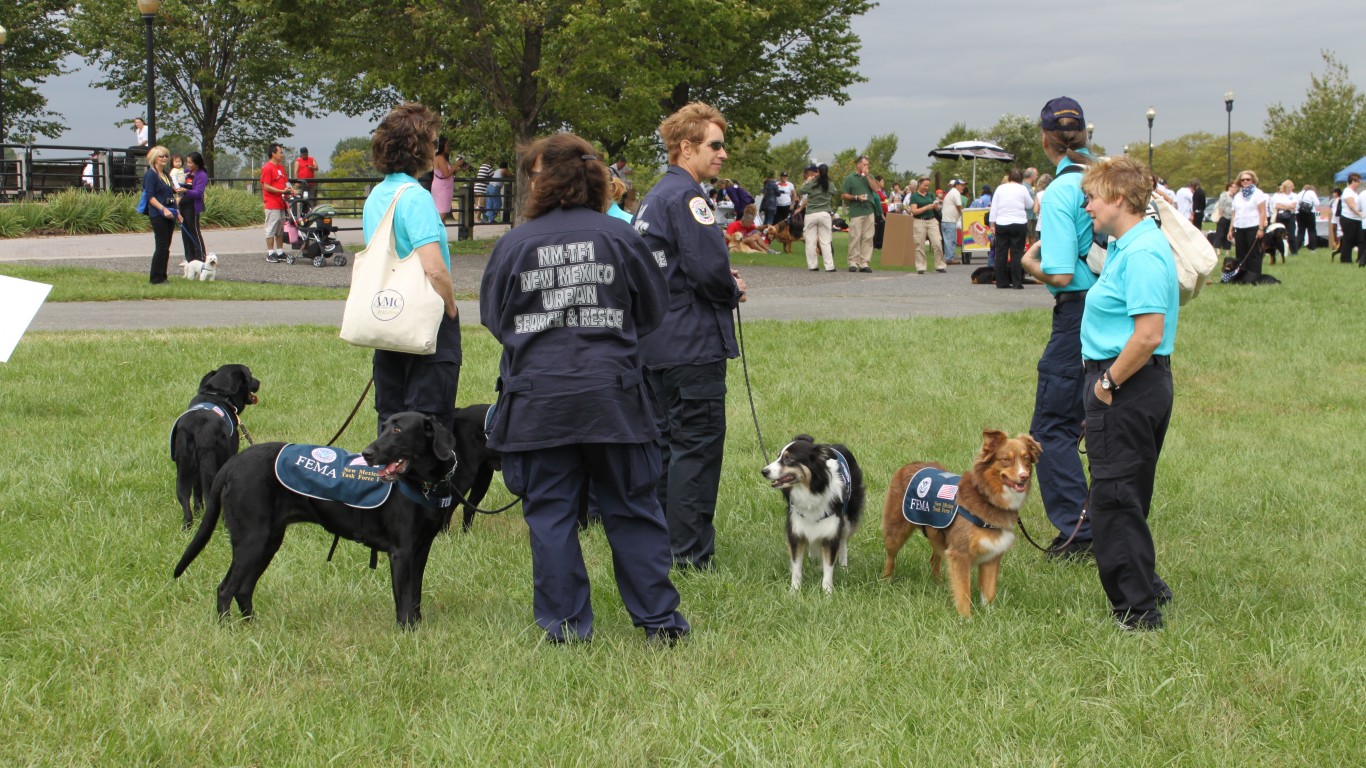
Regardless of how strong or weak the economy is, Americans will always spend money on their pets. The American Pet Products Association estimates that in 2019 Americans spent $75.4 billion on items related to pets such as food, veterinarian care, supplies, toys, and medicine, an increase of 3.9% from 2018.
As much as Americans love their pets, legal protections for our animal companions vary from state to state. Though all states have penalties for animal cruelty, some states make it a priority to ensure animals are safe in their homes, while others are less concerned about animal safety.
24/7 Tempo reviewed the Animal Legal Defense Fund’s “2019 U.S. Animal Protection Laws State Rankings.” The ALDF evaluated state animal protection laws, including the penalties for animal abuse, reporting requirements, offender registration laws, general prohibitions such as prohibition of animal fighting, among other issues.
Click here to see America’s worst state for pets.
In the past year, we’ve seen efforts by several states to curb the practices of puppy mills, which are unlicensed shelters that house animals in inhumane conditions and then sell the animals to pet stores. States are also toughening animal cruelty legislation.
There were 5,201 cases of animal cruelty reported to the FBI in 2018. The agency started collecting animal cruelty data in 2016. It is likely the actual number of animal cruelty cases is much higher. Companies such as pet food businesses and beer makers are providing perks and incentives to adopt rescue animals, and some states are trying to make rescue dogs the official state pet. Here are 25 reasons rescue dogs are the best pets.
Methodology:
To identify the best and worst states for pets, 24/7 Tempo reviewed the Animal Legal Defense Fund’s (ALDF) “2019 U.S. Animal Protection Laws State Rankings.” We used the ALDF’s rank, which evaluates state animal protection laws as well as the penalties for animal abuse, the reporting requirements for veterinarians, offender registration laws, general prohibitions, and much more. The number of pet-owning households came from the American Veterinary Medical Association’s 2012 U.S. Pet Ownership and Demographics Sourcebook, and the incidents of animal cruelty by state came from the FBI National Incident-Based Reporting System for 2017.

1. Illinois
> Maximum penalty for aggravated cruelty: 5 years imprisonment and $25,000 fine
> Animals may be included in domestic violence protective orders: Yes
> Mandatory reporting by veterinarian: Yes
> Households owning pets: 51.8% (6th lowest)
Illinois ranked as the best state for animal protection laws for the 12th consecutive year, according to the Animal Legal Defense Fund ranking. The state imposes felony penalties for cruelty, neglect, fighting, abandonment, and sexual assault of animals.
[in-text-ad]

2. Oregon
> Maximum penalty for aggravated cruelty: 5 years imprisonment and/or $125,000 fine
> Animals may be included in domestic violence protective orders: No
> Mandatory reporting by veterinarian: Yes
> Households owning pets: 63.6% (4th highest)
Inspired by an idea from a fifth-grade class in Beaverton, Oregon, the state passed a law effective Jan. 1 that requires research laboratories to place dogs and cats in shelters if they are no longer needed for research.
3. Colorado
> Maximum penalty for aggravated cruelty: 3 years prison and/or $1,000 fine
> Animals may be included in domestic violence protective orders: Yes
> Mandatory reporting by veterinarian: Yes
> Households owning pets: 61.3% (13th highest)
Colorado lawmakers are weighing a bill that would forbid animal shelters and rescue facilities from euthanizing pets because of a lack of space. The measure would allow the euthanizing of pets under certain circumstances such as health and behavioral issues.

4. Maine
> Maximum penalty for aggravated cruelty: 5 years imprisonment and/or $5,000 fine, plus $10,000 fine and other sanctions
> Animals may be included in domestic violence protective orders: Yes
> Mandatory reporting by veterinarian: Yes
> Households owning pets: 62.9% (5th highest)
Maine passed legislation in 2019 that mandates possession bans for those convicted of animal cruelty. Possession ban prevents convicted animal abusers from owning, possessing, or residing with an animal for a specific time period.
[in-text-ad-2]

5. Rhode Island
> Maximum penalty for aggravated cruelty: 5 years imprisonment or $1,000 fine, and treble civil damages if animal owned by another and 50 hours community service
> Animals may be included in domestic violence protective orders: Yes
> Mandatory reporting by veterinarian: Yes
> Households owning pets: 53.0% (10th lowest)
Rhode Island returned to the top five states for animal protection law in the latest Animal Legal Defense Fund rankings. The nation’s smallest state has felony penalties for violations such as cruelty, neglect, and fighting and a mandatory ban on ownership and possession of some animals after conviction.

6. Massachusetts
> Maximum penalty for aggravated cruelty: 10 years imprisonment and/or $10,000 fine (for subsequent offenses)
> Animals may be included in domestic violence protective orders: Yes
> Mandatory reporting by veterinarian: No
> Households owning pets: 50.4% (the lowest)
A bill has been proposed in Massachusetts that would penalize dog owners who misrepresent their pets as service animals.
[in-text-ad]

7. Louisiana
> Maximum penalty for aggravated cruelty: 10 years imprisonment (with or without hard labor) and/or $25,000 fine
> Animals may be included in domestic violence protective orders: Yes
> Mandatory reporting by veterinarian: No
> Households owning pets: 55.1% (18th lowest)
The maximum penalty for aggravated cruelty to an animal in Louisiana is 10 years imprisonment, with or without hard labor, and/or $25,000 fine.
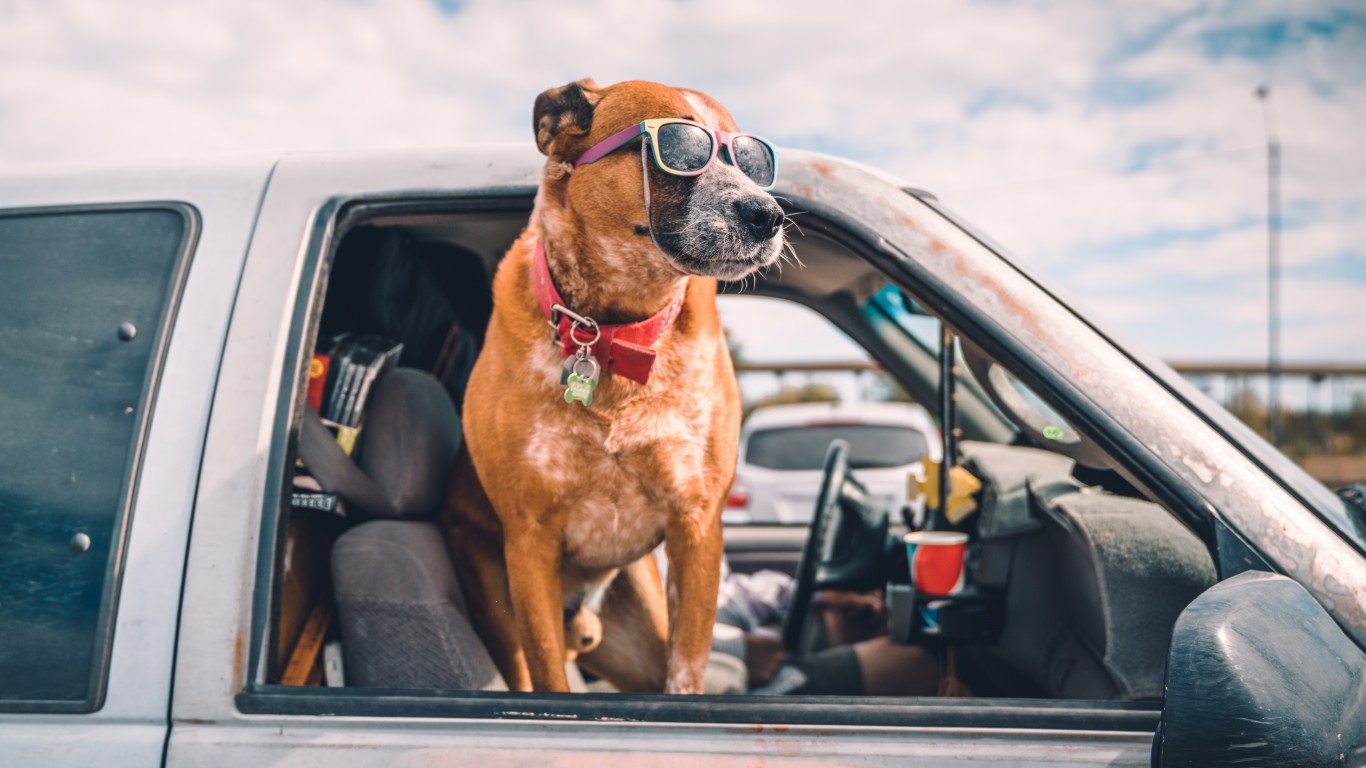
8. California
> Maximum penalty for aggravated cruelty: 3 years imprisonment and/or $20,000 fine
> Animals may be included in domestic violence protective orders: Yes
> Mandatory reporting by veterinarian: Yes
> Households owning pets: 52.9% (8th lowest)
In January of 2019, California became the first state in the nation to pass a law that requires pet stores to sell only animals from shelters or rescue organizations. Stores can be fined $500 for every animal they sell that is not a rescue animal.
9. Washington
> Maximum penalty for aggravated cruelty: 5 years state prison and/or $10,000 fine
> Animals may be included in domestic violence protective orders: No
> Mandatory reporting by veterinarian: No
> Households owning pets: 62.7% (6th highest)
A new law enacted in Wasington this year prohibits municipalities from restricting certain dog breeds and puts the focus on a dog’s behavior and not its breed. These restrictions had often targeted breeds like pit bulls and rottweilers that are stereotyped as dangerous dog breeds. The dog must complete the American Kennel Club’s Canine Citizen program or a similar test that is provided by a Washington city or county. The program assesses whether a dog reacts aggressively to strangers while being petted or when it encounters other animals.
[in-text-ad-2]
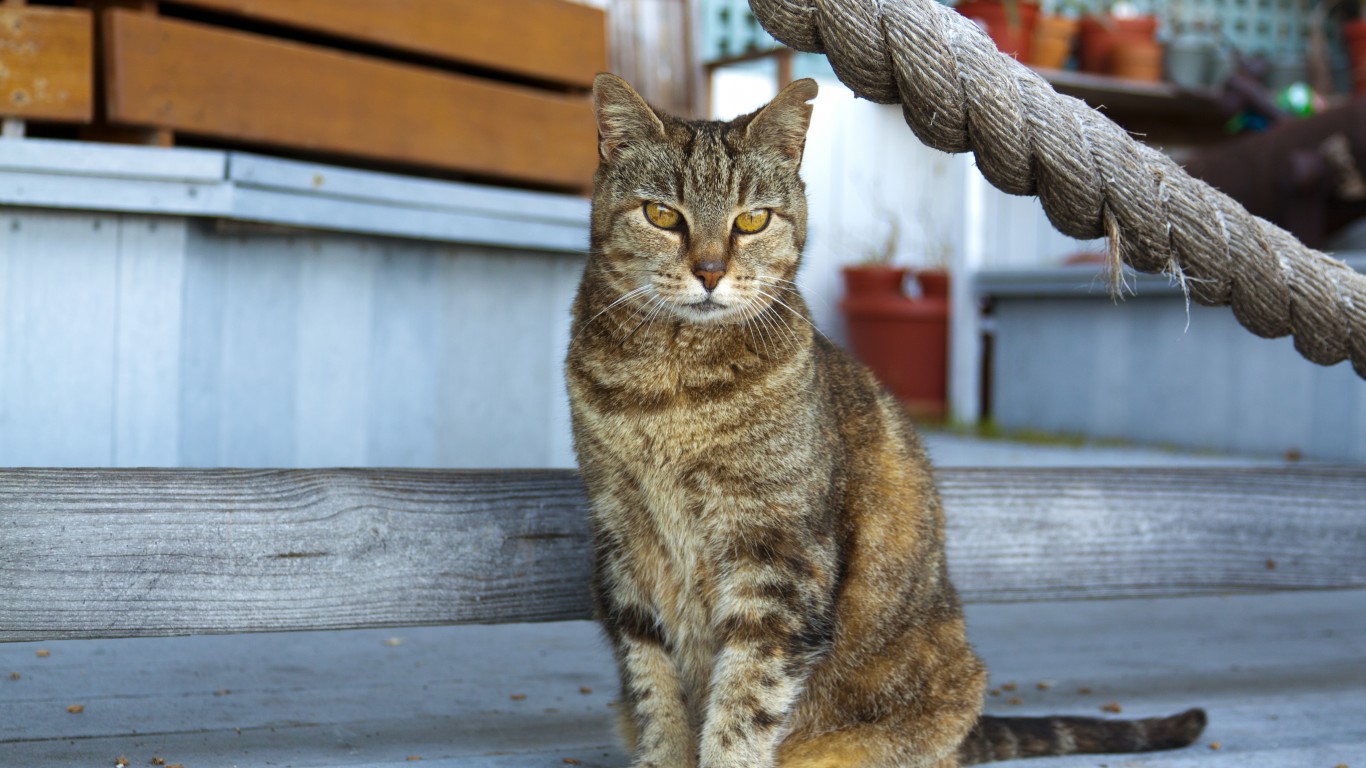
10. Florida
> Maximum penalty for aggravated cruelty: 5 years imprisonment and/or $5,000 fine
> Animals may be included in domestic violence protective orders: Yes
> Mandatory reporting by veterinarian: No
> Households owning pets: 54.4% (16th lowest)
Just over half of households in Florida have pets. A study from the University of Florida found that pet dogs provide important social support to children when the kids are under stress. The children in the study were between 7 and 12 years old.
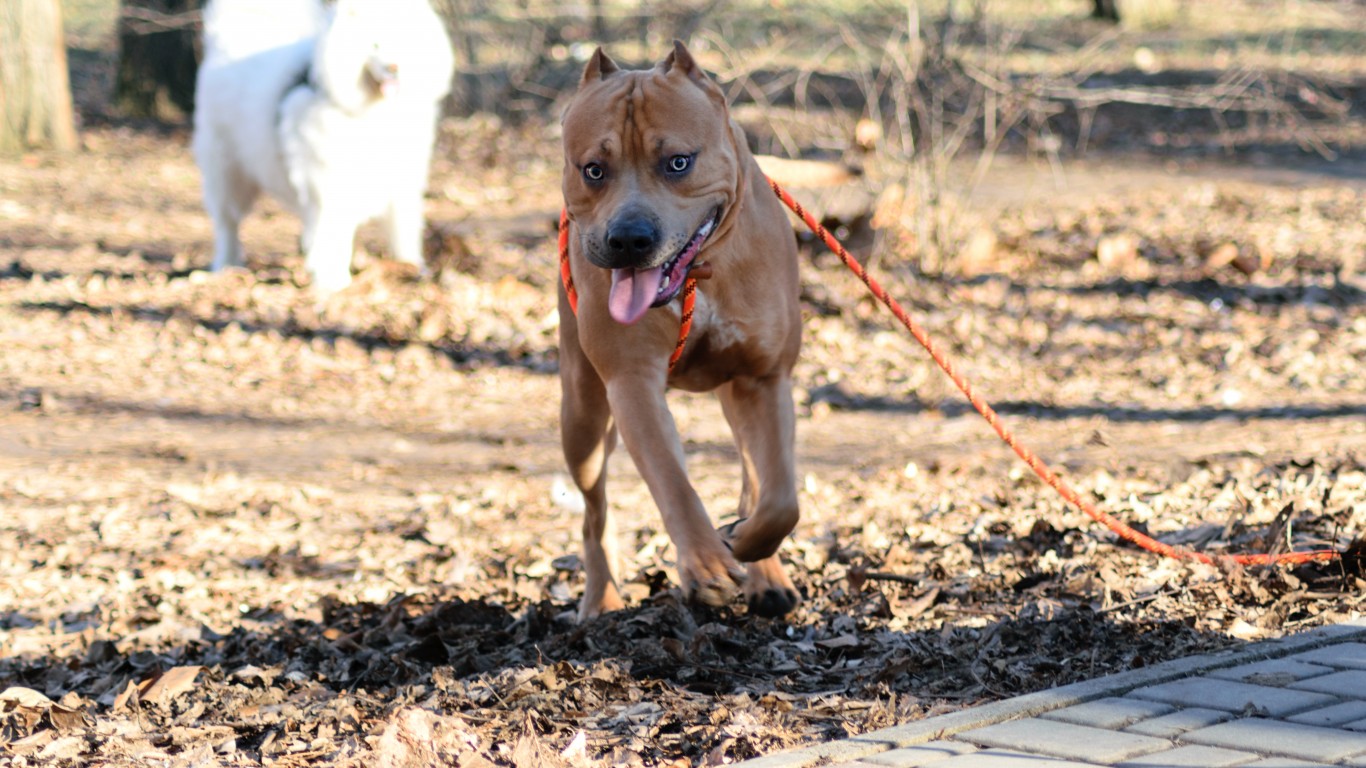
11. Texas
> Maximum penalty for aggravated cruelty: 20 years imprisonment and $10,000 fine
> Animals may be included in domestic violence protective orders: No
> Mandatory reporting by veterinarian: No
> Households owning pets: 58.5% (21st highest)
The state of Texas takes animal cruelty seriously. The maximum penalty for aggravated cruelty in Texas is 20 years in prison and a $10,000 fine.
[in-text-ad]
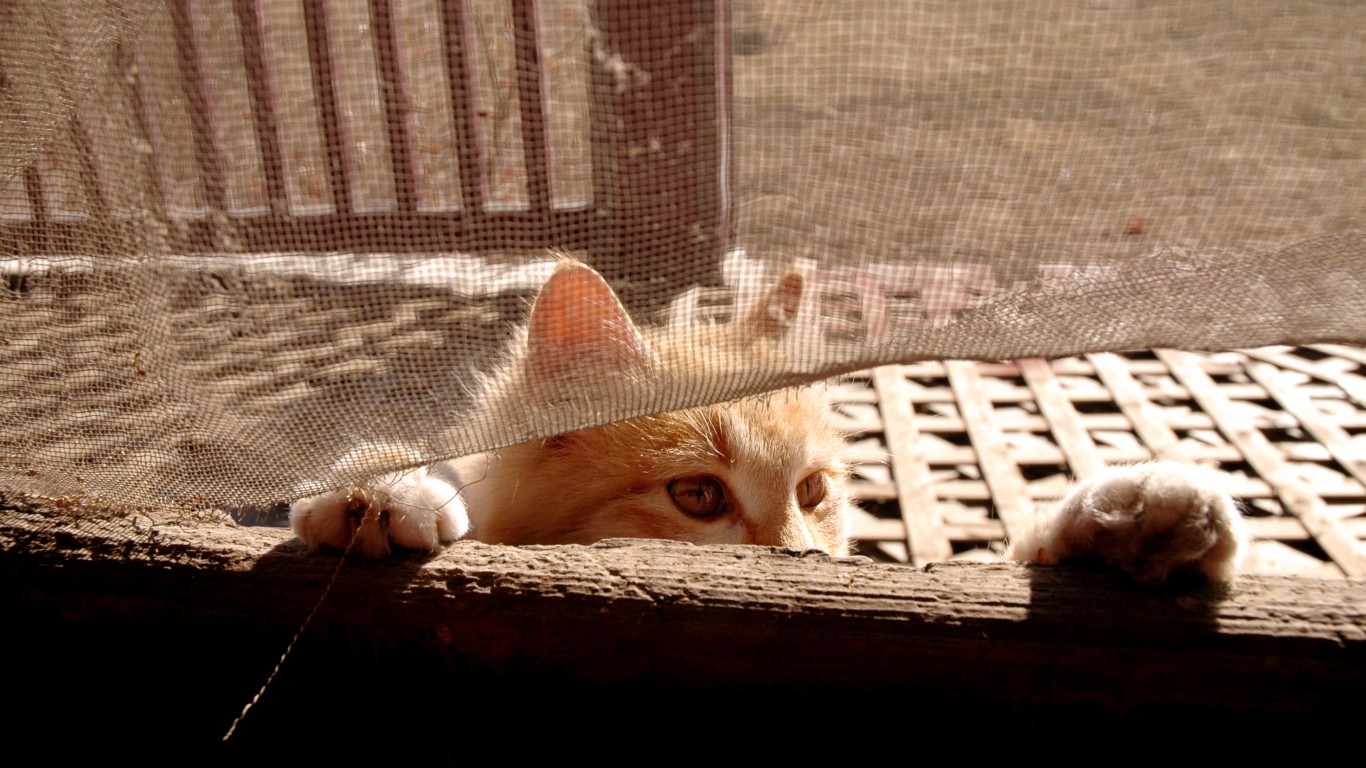
12. Indiana
> Maximum penalty for aggravated cruelty: 3 years (2 1/2 years) and $10,000 fine
> Animals may be included in domestic violence protective orders: Yes
> Mandatory reporting by veterinarian: No
> Households owning pets: 59.9% (16th highest)
As of July 1, 2019, if a person in Indiana is on probation or parole for abusing an animal, that person is forbidden from owning or training a dog or cat.
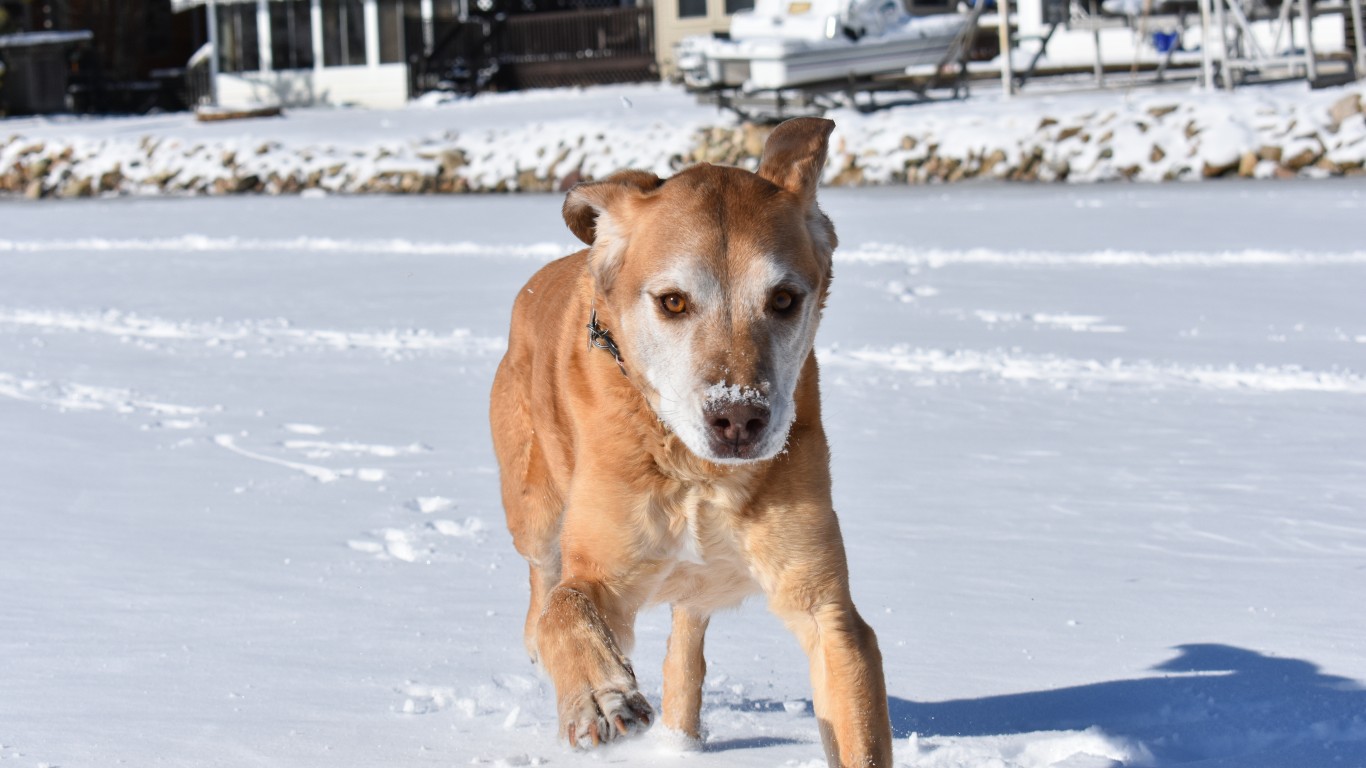
13. Michigan
> Maximum penalty for aggravated cruelty: 10 years imprisonment, $5,000 fine, and/or 500 hours community service
> Animals may be included in domestic violence protective orders: Yes
> Mandatory reporting by veterinarian: No
> Households owning pets: 55.4% (19th lowest)
Michigan State Rep. Nate Shannon is sponsoring legislation that would make it illegal for residents to declaw their pet cats.
14. New Hampshire
> Maximum penalty for aggravated cruelty: 7 years imprisonment and/or $4,000 fine (for subsequent offenses)
> Animals may be included in domestic violence protective orders: Yes
> Mandatory reporting by veterinarian: No
> Households owning pets: 56.8% (24th lowest)
New legislation in New Hampshire makes possession bans mandatory for those convicted of animal cruelty. The new laws also forbid possessing, making, or selling animal fighting materials, and the state also prohibits the sale and loaning of animals for fighting.
[in-text-ad-2]

15. Pennsylvania
> Maximum penalty for aggravated cruelty: 7 years imprisonment and/or $15,000 fine (for subsequent offenses)
> Animals may be included in domestic violence protective orders: No
> Mandatory reporting by veterinarian: No
> Households owning pets: 56.9% (24th highest)
Pennsylvania passed a law in late 2018 that permits public safety workers to remove unattended animals from vehicles if they’re in danger from heat or cold without liability for any damages to the vehicle. The law does not apply to Good Samaritans.

16. Virginia
> Maximum penalty for aggravated cruelty: 5 years imprisonment and/or 1 year imprisonment and $2,500 fine (for subsequent offenses)
> Animals may be included in domestic violence protective orders: No
> Mandatory reporting by veterinarian: Yes
> Households owning pets: 53.4% (11th lowest)
The Virginia-based nonprofit Island Dog Rescue brought in dogs from Puerto Rico in January, rescuing the animals from the devastation on that island following earthquakes there.
[in-text-ad]

17. New Jersey
> Maximum penalty for aggravated cruelty: 5 years imprisonment and/or $15,000 fine
> Animals may be included in domestic violence protective orders: Yes
> Mandatory reporting by veterinarian: No
> Households owning pets: 50.7% (3rd lowest)
It costs an estimated $2,398 a month to own a pet in New Jersey, the highest of any state.
18. West Virginia
> Maximum penalty for aggravated cruelty: 5 years jail and $5,000 fine
> Animals may be included in domestic violence protective orders: Yes
> Mandatory reporting by veterinarian: Yes
> Households owning pets: 62.1% (8th highest)
West Virginia State Sen. Ryan Weld in late January proposed a resolution that would make shelter dogs the official state dog. The resolution was approved by the state Senate and still needs the backing of the House of Delegates to be official.

19. Nevada
> Maximum penalty for aggravated cruelty: 5 years prison and $10,000 fine, plus restitution (for subsequent offenses)
> Animals may be included in domestic violence protective orders: No
> Mandatory reporting by veterinarian: No
> Households owning pets: 55.6% (20th lowest)
Nevada enacted a law in 2019 that requires state-funded housing units to be pet friendly. The state enforces felony penalties for pet cruelty, neglect, fighting, abandonment, and sexual assault.
[in-text-ad-2]

20. Vermont
> Maximum penalty for aggravated cruelty: 5 years imprisonment and/or $5,000 fine
> Animals may be included in domestic violence protective orders: Yes
> Mandatory reporting by veterinarian: No
> Households owning pets: 70.8% (the highest)
Vermont has the highest percentage of households owning pets in the United States at 70.8%.

21. Nebraska
> Maximum penalty for aggravated cruelty: 3 years imprisonment and 18 months post-release supervision and/or $10,000 fine (for subsequent offense)
> Animals may be included in domestic violence protective orders: No
> Mandatory reporting by veterinarian: No
> Households owning pets: 51.3% (5th lowest)
Nebraska imposes felony penalties for cruelty, neglect, fighting, and abandonment of pets.
[in-text-ad]
22. Kansas
> Maximum penalty for aggravated cruelty: 5 days-1 year imprisonment and $500-$2,500 fine (for subsequent offenses)
> Animals may be included in domestic violence protective orders: No
> Mandatory reporting by veterinarian: Yes
> Households owning pets: 61.0% (15th highest)
In 2018, Kansas passed a so-called hot-car measure that shields Good Samaritans who break into vehicles to save children and animals in danger of overheating from liability.

23. Delaware
> Maximum penalty for aggravated cruelty: 8 years imprisonment and fine determined by court
> Animals may be included in domestic violence protective orders: Yes
> Mandatory reporting by veterinarian: No
> Households owning pets: 56.6% (23rd lowest)
In January, Delaware passed a law intended to protect dogs from life-threatening weather. The measure is intended to prevent dogs from being tied up for more than nine hours outdoors during extreme hot and cold weather. Delaware has the nation’s highest rate of animal cruelty in the country, at more than 113 reported offenses per 100,000 people.
24. Tennessee
> Maximum penalty for aggravated cruelty: 6 years imprisonment and $3,000 fine (for subsequent offenses)
> Animals may be included in domestic violence protective orders: Yes
> Mandatory reporting by veterinarian: No
> Households owning pets: 59.6% (17th highest)
The Tennessee Legislature is weighing a measure that would prevent those convicted of abusing animals from owning a pet for at least two years after they have been convicted of animal cruelty.
[in-text-ad-2]

25. Connecticut
> Maximum penalty for aggravated cruelty: 1 to 10 years imprisonment and/or $10,000 fine (for subsequent offenses)
> Animals may be included in domestic violence protective orders: Yes
> Mandatory reporting by veterinarian: No
> Households owning pets: 54.4% (16th lowest)
Connecticut passed a law in 2018 that protects Good Samaritans who forcibly enter vehicles to save children and animals in danger from liability.

26. Minnesota
> Maximum penalty for aggravated cruelty: 4 years imprisonment and/or $10,000 fine
> Animals may be included in domestic violence protective orders: No
> Mandatory reporting by veterinarian: Yes
> Households owning pets: 53.0% (10th lowest)
Minnesota has laws protecting animals against cruelty, neglect, fighting, and abandonment. And the court may restrict ownership of an animal after a conviction.
[in-text-ad]

27. Arizona
> Maximum penalty for aggravated cruelty: 7 years imprisonment and/or $150,000 fine
> Animals may be included in domestic violence protective orders: No
> Mandatory reporting by veterinarian: Yes
> Households owning pets: 59.5% (18th highest)
The harshest penalty for aggravated cruelty against animals in Arizona is seven years in prison and/or a $150,000 fine.
28. Oklahoma
> Maximum penalty for aggravated cruelty: 5 years prison or 1 year county jail or $5,000 fine
> Animals may be included in domestic violence protective orders: Yes
> Mandatory reporting by veterinarian: Yes
> Households owning pets: 58.9% (20th highest)
Pet insurance in Oklahoma is $28.02 a month, the third-cheapest of any state in the country.

29. Ohio
> Maximum penalty for aggravated cruelty: 3 years imprisonment and $10,000 fine
> Animals may be included in domestic violence protective orders: No
> Mandatory reporting by veterinarian: No
> Households owning pets: 57.4% (23rd highest)
Ohio lawmakers are considering a bill that would increase penalties for cruelty towards companion animals. Those found guilty of that crime could be punished by up to 16 months in prison and a $10,000 fine under the proposed law.
[in-text-ad-2]
30. Wisconsin
> Maximum penalty for aggravated cruelty: 3.5 years imprisonment and/or $10,000 fine
> Animals may be included in domestic violence protective orders: No
> Mandatory reporting by veterinarian: Yes
> Households owning pets: 57.5% (22nd highest)
The cost of pet insurance in Wisconsin is $44.47 a month, the fifth-highest in the nation.
31. Maryland
> Maximum penalty for aggravated cruelty: 3 years imprisonment and/or $5,000 fine
> Animals may be included in domestic violence protective orders: No
> Mandatory reporting by veterinarian: No
> Households owning pets: 52.3% (7th lowest)
A federal judge in early February threw out a pet store owners’ challenge to the state of Maryland’s new ban on the sale of dogs and cats in pet stores. The action was seen as a way to curb the sale of animals from so-called “puppy mills,” unlicensed and dirty shelters for pets.
[in-text-ad]

32. New York
> Maximum penalty for aggravated cruelty: 2 years imprisonment and $5,000 fine
> Animals may be included in domestic violence protective orders: Yes
> Mandatory reporting by veterinarian: No
> Households owning pets: 50.6% (2nd lowest)
Legislators in Albany have sponsored a bill that would ban pet stores in New York from selling puppies, kittens, or bunnies in an attempt to halt the flow of dogs from illegal puppy mills from out of state.
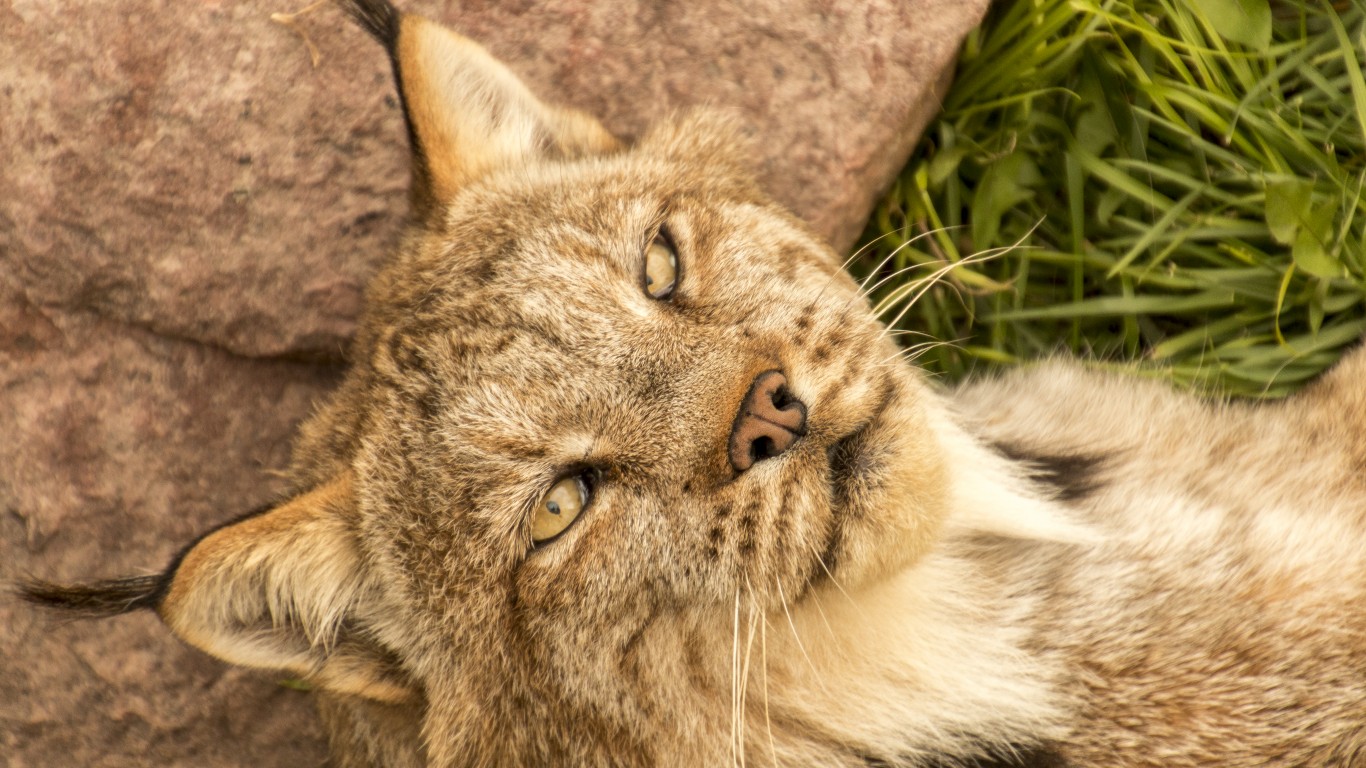
33. South Dakota
> Maximum penalty for aggravated cruelty: 5 years state penitentiary and $10,000 fine
> Animals may be included in domestic violence protective orders: No
> Mandatory reporting by veterinarian: No
> Households owning pets: 65.6% (3rd highest)
South Dakota ranks third in the nation for pet ownership, according to data from the Animal Legal Defense Fund. Animal cruelty, fighting, and sexual assualt are felonies in South Dakota.
34. Arkansas
> Maximum penalty for aggravated cruelty: 10 years imprisonment and $10,000 fine
> Animals may be included in domestic violence protective orders: Yes
> Mandatory reporting by veterinarian: No
> Households owning pets: 62.4% (7th highest)
Arkansas Gov. Asa Hutchinson signed a bill in April of 2019 that would make misrepresenting your pet as a service animal a misdemeanor and carry a $250 fine.
[in-text-ad-2]

35. Missouri
> Maximum penalty for aggravated cruelty: 4 years imprisonment and/or $10,000 fine
> Animals may be included in domestic violence protective orders: No
> Mandatory reporting by veterinarian: Yes
> Households owning pets: 61.4% (12th highest)
Missouri state Rep. Chrissy Sommer filed a bill in February that would make misrepresenting a pet as a service dog or emotional support animal a misdemeanor.
36. Alaska
> Maximum penalty for aggravated cruelty: 5 years imprisonment and/or $50,000 fine
> Animals may be included in domestic violence protective orders: Yes
> Mandatory reporting by veterinarian: No
> Households owning pets: N/A
Alaska passed a law that requires divorce court judges to consider the well-being of pets when the judge weighs the decision over which spouse keeps the animals.
[in-text-ad]

37. Montana
> Maximum penalty for aggravated cruelty: 2 years in prison and/or $2,500 fine
> Animals may be included in domestic violence protective orders: No
> Mandatory reporting by veterinarian: No
> Households owning pets: 61.3% (13th highest)
Montana improved its rank on the latest ALDF list from 43 to 37. Montana now requires defendants in animal cruelty cases to post a bond to cover the costs of care, such as medical expenses of the animal, if cruelty is proved.

38. Hawaii
> Maximum penalty for aggravated cruelty: 5 years imprisonment and/or $10,000 fine
> Animals may be included in domestic violence protective orders: Yes
> Mandatory reporting by veterinarian: No
> Households owning pets: N/A
Hawaii is one of four states that does not have a law prohibiting the sexual assault of animals, according to the ALDF.

39. North Carolina
> Maximum penalty for aggravated cruelty: 5-6 months imprisonment and/or fine at the discretion of the court
> Animals may be included in domestic violence protective orders: Yes
> Mandatory reporting by veterinarian: No
> Households owning pets: 56.4% (22nd lowest)
The maximum penalty for aggravated cruelty against an animal in North Carolina is the lightest of any state. The punishment is five to six months in prison and/or a fine determined by the court.
[in-text-ad-2]

40. Georgia
> Maximum penalty for aggravated cruelty: 10 years prison and/or $100,000 fine
> Animals may be included in domestic violence protective orders: No
> Mandatory reporting by veterinarian: No
> Households owning pets: 55.1% (18th lowest)
Though Georgia ranks among the worst states for pets — animal cruelty and fighting are the only felonies in Georgia — some in the state are trying to improve conditions. Georgia held its first state pet adoption day last March to bring awareness for greater animal protection rules. In early 2019, the state Department of Agriculture began an internal review to improve protections for animals..
41. North Dakota
> Maximum penalty for aggravated cruelty: 5 years imprisonment and/or $10,000 fine
> Animals may be included in domestic violence protective orders: No
> Mandatory reporting by veterinarian: Yes
> Households owning pets: 53.9% (13th lowest)
North Dakota has one of the highest rates of animal cruelty offenses per capita. In 2018, there were 10.7 reported cases per 100,000 state residents, the fifth highest rate among states.
[in-text-ad]

42. South Carolina
> Maximum penalty for aggravated cruelty: 10 years imprisonment and/or fine at discretion of court, when injury or loss is $10,000 or more
> Animals may be included in domestic violence protective orders: Yes
> Mandatory reporting by veterinarian: No
> Households owning pets: 54.1% (14th lowest)
South Carolina has one of the highest rates of animal cruelty in the country. There were 295 cases, accounting for 5.9 reported animal cruelty incidents per 100,000 residents — the seventh highest rate among states.

43. Utah
> Maximum penalty for aggravated cruelty: 5 years imprisonment and/or $5,000 fine
> Animals may be included in domestic violence protective orders: No
> Mandatory reporting by veterinarian: No
> Households owning pets: 51.2% (4th lowest)
Few animal abuse crimes are classified as felonies in Utah — neglect, sexual assault, and abandonment are all considered misdemeanors.

44. Alabama
> Maximum penalty for aggravated cruelty: 10 years imprisonment (includes hard labor) and $15,000 fine
> Animals may be included in domestic violence protective orders: No
> Mandatory reporting by veterinarian: Yes
> Households owning pets: 59.5% (18th highest)
A bill that would give the Alabama Department of Agriculture authority over animal industries and the reporting of animal cruelty in Alabama passed the state Senate committee on Feb. 19.
[in-text-ad-2]

45. Idaho
> Maximum penalty for aggravated cruelty: 3 years prison and/or $5,000 fine
> Animals may be included in domestic violence protective orders: No
> Mandatory reporting by veterinarian: No
> Households owning pets: 62.0% (9th highest)
Idaho is one of just two states in which animal cruelty is not prosecuted as a felony. Neglect and abandonment of pets are also misdemeanors in the state.

46. Wyoming
> Maximum penalty for aggravated cruelty: 2 years imprisonment and/or $5,000 fine
> Animals may be included in domestic violence protective orders: Yes
> Mandatory reporting by veterinarian: No
> Households owning pets: 61.8% (10th highest)
Wyoming ranks as one of the worst states for pets in part because of relatively light punishments for aggravated cruelty. Its maximum penalty for the crime is just two years behind bars — one of just five states in which the max sentence is that low.
[in-text-ad]
47. Kentucky
> Maximum penalty for aggravated cruelty: 5 years imprisonment and $10,000 fine
> Animals may be included in domestic violence protective orders: Yes
> Mandatory reporting by veterinarian: No
> Households owning pets: 61.6% (11th highest)
Kentucky is one of just a dozen U.S. states in which courts cannot restrict a person from owning animals after they were convicted of animal abuse.
48. New Mexico
> Maximum penalty for aggravated cruelty: 18 months imprisonment and $5,000 fine
> Animals may be included in domestic violence protective orders: No
> Mandatory reporting by veterinarian: No
> Households owning pets: 67.6% (2nd highest)
New Mexico has one of the lowest maximum penalties for aggravated animal cruelty at 18 months in prison and a $5,000 fine.

49. Iowa
> Maximum penalty for aggravated cruelty: 5 years imprisonment and $7,500 fine
> Animals may be included in domestic violence protective orders: Yes
> Mandatory reporting by veterinarian: No
> Households owning pets: 53.6% (12th lowest)
Under a proposed law, Iowa would toughen penalties against those who abuse, neglect, or torture animals and would require mental health evalutations for the worst offenders. The Humane Society of the United States Iowa Chapter said the Hawkeye State is one of only two states that don’t prosecute offenders as felons for their first animal abuse offense.
[in-text-ad-2]

50. Mississippi
> Maximum penalty for aggravated cruelty: 5 years imprisonment, $5,000 fine, or both
> Animals may be included in domestic violence protective orders: No
> Mandatory reporting by veterinarian: No
> Households owning pets: 56.4% (22nd lowest)
Largely due to its lax laws protecting animals, Mississippi ranks as the worst state for pets. It is one of just two states in which animal cruelty is not a felony. The state also has no felony penalties for animal neglect or abandonment, and courts cannot restrict animal ownership for a Mississippi resident convicted of these types of crimes.
Travel Cards Are Getting Too Good To Ignore (sponsored)
Credit card companies are pulling out all the stops, with the issuers are offering insane travel rewards and perks.
We’re talking huge sign-up bonuses, points on every purchase, and benefits like lounge access, travel credits, and free hotel nights. For travelers, these rewards can add up to thousands of dollars in flights, upgrades, and luxury experiences every year.
It’s like getting paid to travel — and it’s available to qualified borrowers who know where to look.
We’ve rounded up some of the best travel credit cards on the market. Click here to see the list. Don’t miss these offers — they won’t be this good forever.
Thank you for reading! Have some feedback for us?
Contact the 24/7 Wall St. editorial team.
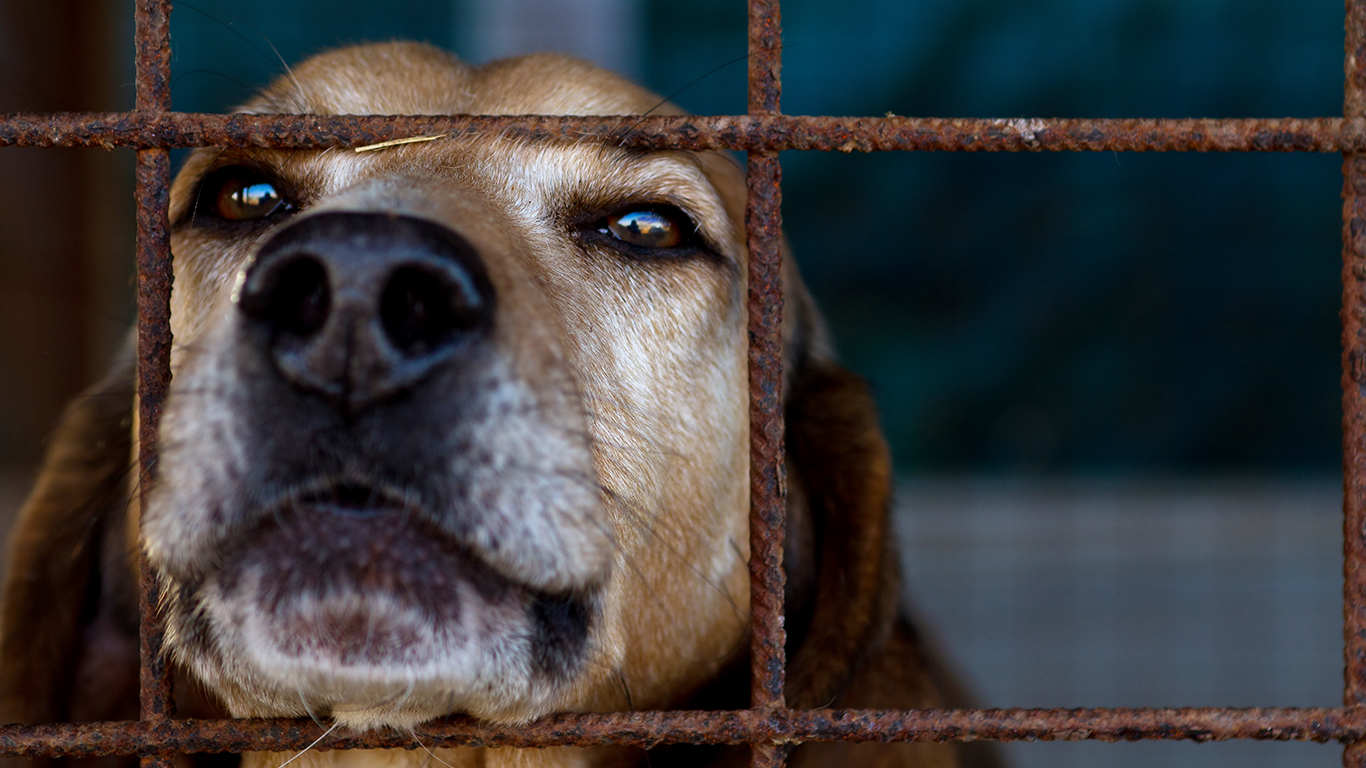 24/7 Wall St.
24/7 Wall St.



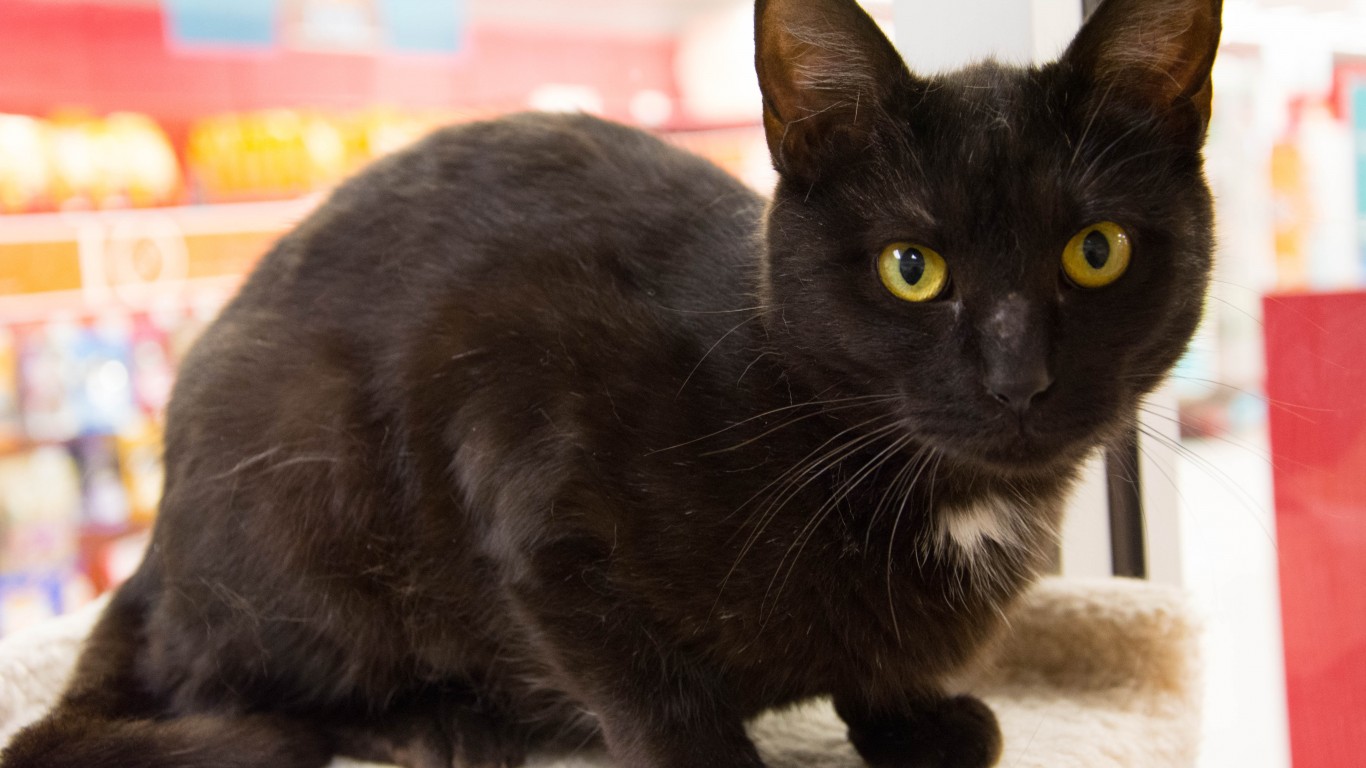
 24/7 Wall St.
24/7 Wall St.
 24/7 Wall St.
24/7 Wall St.

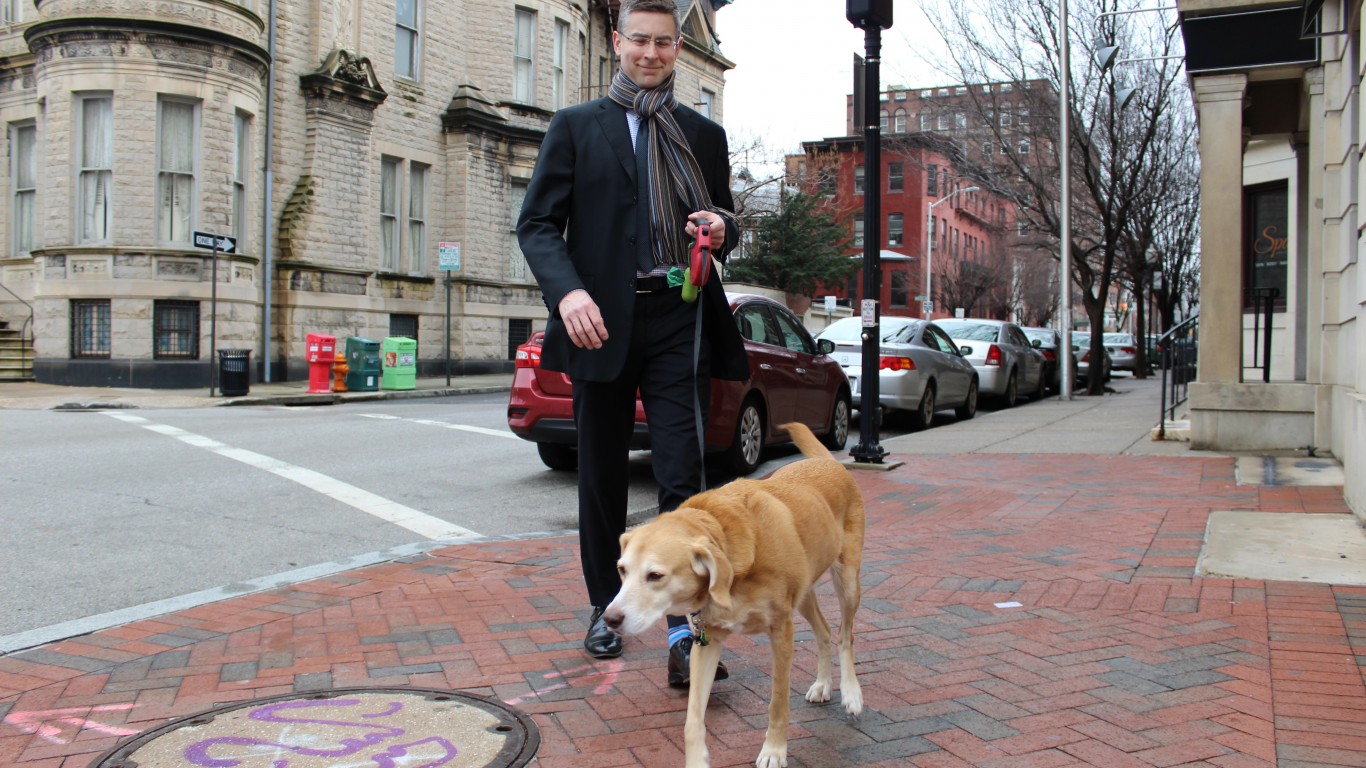
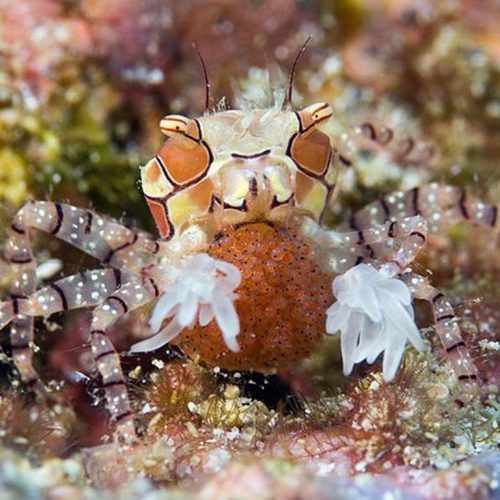 24/7 Wall St.
24/7 Wall St.
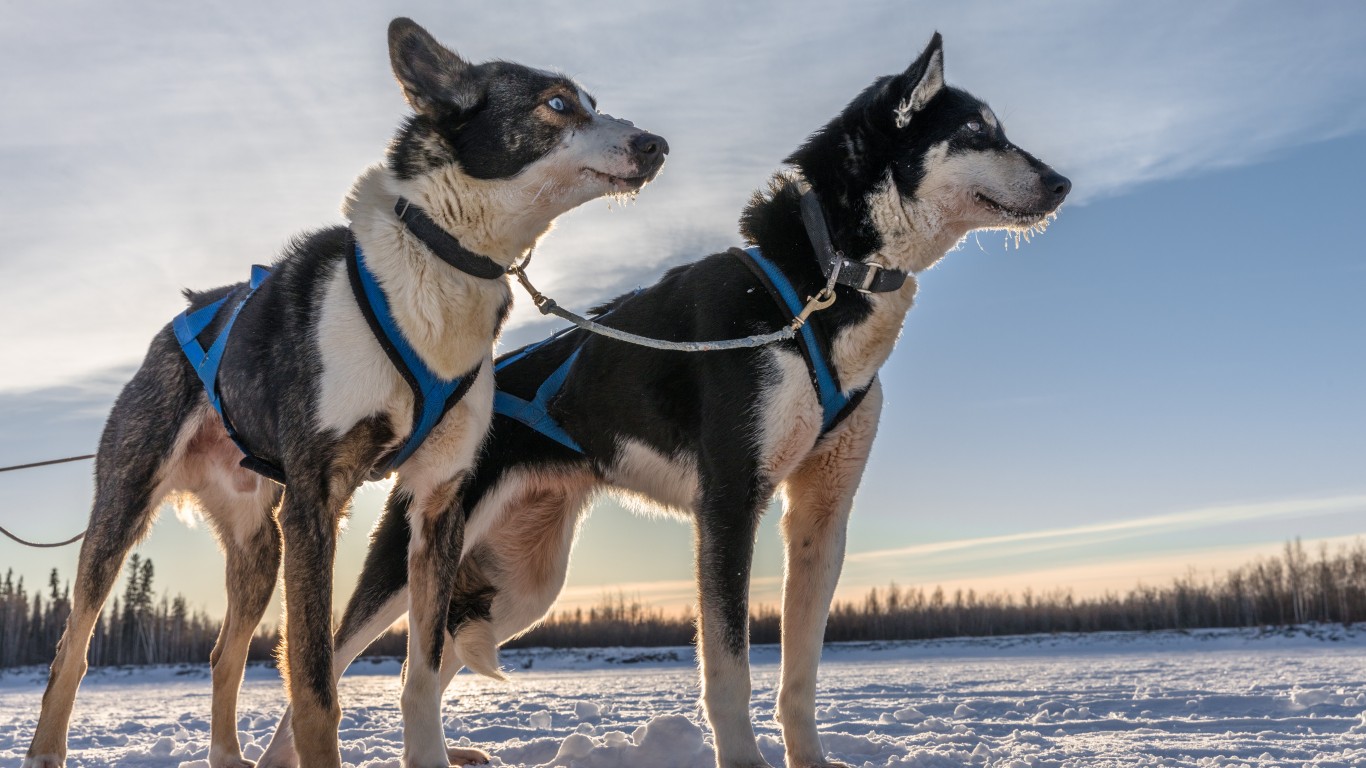

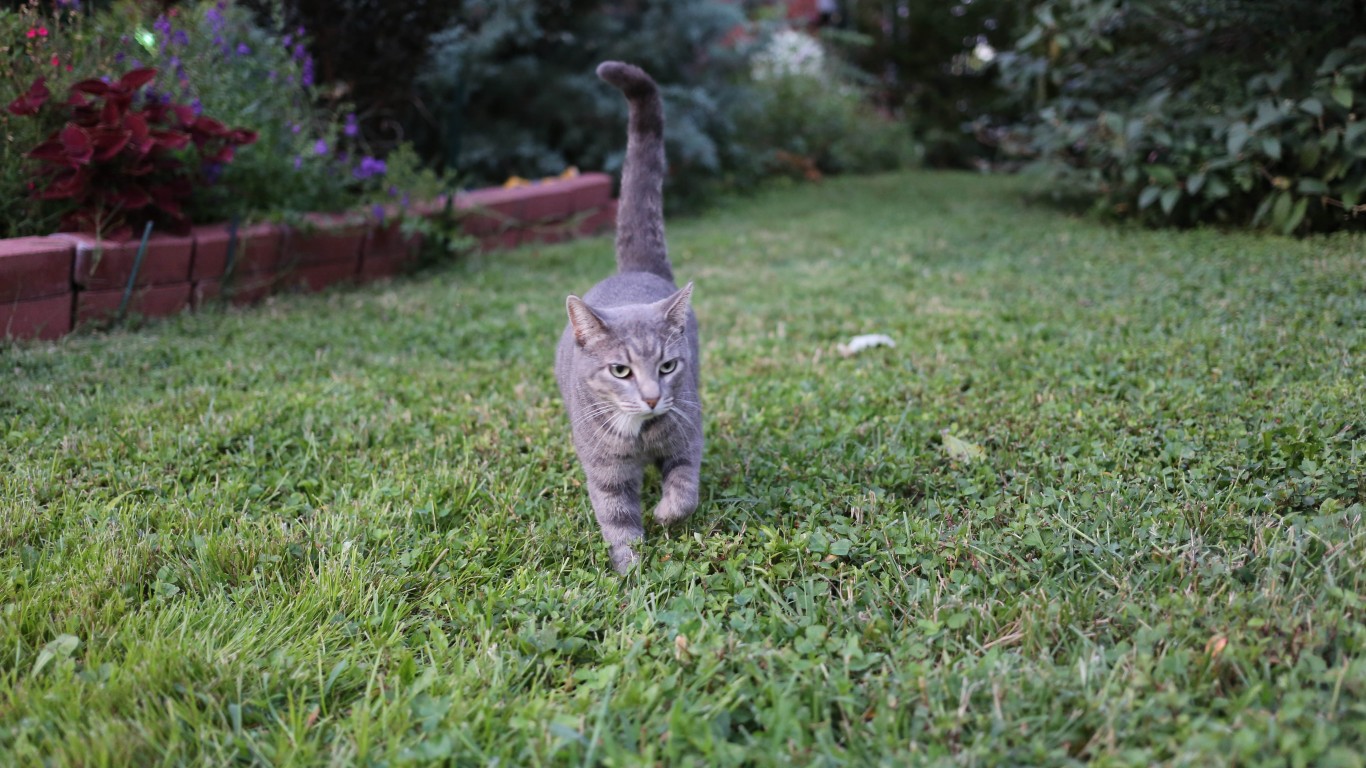
 24/7 Wall St.
24/7 Wall St.